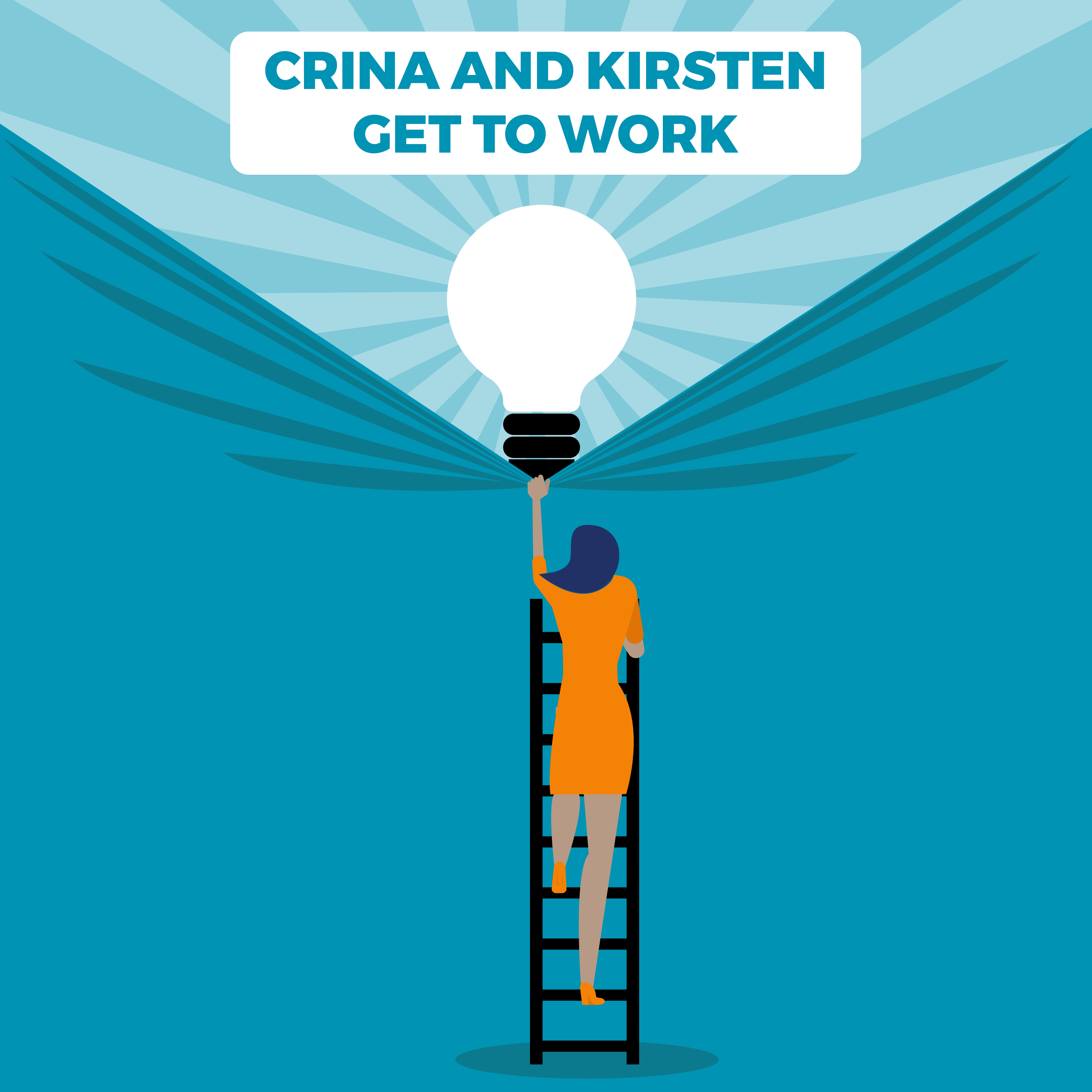Crina and Kirsten Get to Work

We have one single mission: Help women find ease, meaning and joy at work and in life. We use our experiences as business owners, entrepreneurs, mentors and inspirational leaders to explore topics that all working women care about: shitty bosses; smashing the patriarchy; balancing work and life; navigating change and getting what you want! We guarantee that you will be entertained and inspired... promise!
Episodes
Episodes



Friday May 07, 2021
Philosophy Can Change Your Work...Seriously!
Friday May 07, 2021
Friday May 07, 2021
Stoicism teaches us how to keep a calm and rational mind no matter what. This ancient philosophy lends insight into understanding and focusing on what you can control while letting go and accepting what you can't.
SHOW NOTES
Today on Crina and Kirsten Get to Work our hosts do an archaeological dig into an ancient philosophy - Stoicism - to find the golden nuggets to create more ease, meaning and joy at work. The idea for this episode comes from Ryan Holiday’s Daily Stoic podcast - 2-3 minute Stoic inspired daily meditations to help you live your best life. Ryan is a New Your Times best selling author and his style and content are really relatable. Okay - so now you know it, Kirsten got a little obsessed - and highly recommends the podcast.
Stoicism was created by a dude named Zeno in Athens in the third century BC. Stoicism is a school of philosophy for people who want to get stuff done in the world - then and now. As a side note, it was the philosophical inspiration for cognitive behavioral therapy - cool. It has been a relatively male-dominated school of thought. Crina and Kirsten make it the working woman’s philosophy.
In addition to Zeno, three people took Zenp’s work and ran with it. Marcus Aurelius, reputed to be the last good emperor of the Roman Empire and the most powerful man on earth, journalled his thoughts each day. This journal has been published as the book Meditations. Epictetus was born a slave and went on to found his own school and taught many of Rome’s greatest minds, one of which was Marcus Aurelius. Epictetus’ teachings were memorialized by another of his students, Arrian on Discourses and Enchiridion. Senec was a tutor and adviser to Nero and Rome’s best playwright and super hero power broker – sometimes said to be what we think of as the modern modern day entrepreneur. His personal letters are another source of Stoic philosophy.
Stoicism teaches how to keep a calm and rational mind no matter what happens to you and it helps you understand and focus on what you can control and not worry about and accept what you can't control. The goal of Stoicism is eudaimonia or supreme happiness or fulfilment attainable by human beings - core purpose or the good life – a flourishing, lofty, and smoothly flowing life. The idea is that we can control our own behavior, but not the outcome of our behavior or others’ behaviors; and a calm and rational mind allows us to accept those outcomes.
There are five main elements according to our ametuer Stoics, Kirsten and Crina:
Nature: Nature is rational. Live in agreement with nature
Law of Reason: The universe is governed by the law of reason.
Virtue: Courage, justice and discipline - and virtue is its own reward
Control: Focus on what you can control and accept what you cannot
Wisdom: Wisdom is the root virtue (see above).
Crina and Kirsten turn to modern female Stoics to explore the importance of emotion in Stoicism, and some core principles applied to women and work, such as The Way is Through, Don’t Make Things Harder than they Need to Be, Impossible Without Your Consent, Keep it Simple, Protect Your Peace of Mind and A Career is Not a Life Sentence.
This episode is a great introduction to Stoicism and how it can bring more ease, meaning and joy to work and life. And of course - the obvious - that men do not have the corner on Stoicism - or anything else.
Stoicism and Emotion: An Interview with Professor Margaret Graver (dailystoic.com)
Nutshell: Stoicism: a practical philosophy for life and work
A Universal Philosophy: Great Insights From Female Stoics (dailystoic.com)
Stoicism (Stanford Encyclopedia of Philosophy)



Friday Apr 23, 2021
Evaluations Don't Need to Suck
Friday Apr 23, 2021
Friday Apr 23, 2021
Feedback is AWESOME, unless it’s not. The crazy thing is that the vast majority of evaluations/assessments/performance reviews are lame and unproductive, yet we are subjected to them time and time again. The good news is that employee reviews don’t need to suck!
SHOW NOTES
On this second in a series of episodes exploring what does not need to suck at work, Crina and Kirsten delve into workplace performance evaluations.
And yes, even in the midst of a year into the pandemic, evaluations of how we do at work continue. Evaluations, reviews, appraisals . . . so many names for what can be stress inducing and a waste of time. To understand how we got here with evaluations, let’s look at the history.
Evaluations can be traced back to WWI when the military wanted to identify poor performers. By the 1960s, 90% of companies were using appraisals and ranking systems. During this same time there was a shortage of managerial talent and companies started shifting away from evaluations that reflected performance by scores to using evaluations as a professional development tool. This new approach was based on a theory that employees wanted to perform well and would do so if supported properly, opposed to the previous theory which assumed you had to motivate people with material rewards and punishments. And this is the part where evaluations do not have to suck - evaluations should motivate and inspire employees to do better. Companies have moved back to ranking and scoring rather than motivating and inspiring and we see evaluation programs trying to do it all and not doing a lot of it well. The Future of Performance Reviews (hbr.org)
All of this is to say that we are all still trying to figure out how to
Support employees
Reward good performance
Recruit and retain talent
Eliminate poor performers who are “uncoachable”
Here’s some of what we know about performance reviews and employee engagement:
45% of HR leaders do not think annual performance reviews are an accurate appraisal for employee’s work. Employee Performance Program & Coaching | CoreAxis Corporate Training & eLearning
Only 8% of companies believe their performance management process is highly effective in driving business value, while 58% say it’s not an effective use of time. Employee Performance Program & Coaching | CoreAxis Corporate Training & eLearning
The Harvard Business Review summarizes workers experience, “[w]ith their heavy emphasis on financial rewards and punishments and their end-of-year structure, [annual reviews] hold people accountable for past behavior at the expense of improving current performance and grooming talent for the future, both of which are critical for organizations’ long-term survival. In contrast, regular conversations about performance and development change the focus to building the workforce your organization needs to be competitive both today and years from now. Business researcher Josh Bersin estimates that about 70% of multinational companies are moving toward this model, even if they haven’t arrived quite yet.” The Future of Performance Reviews (hbr.org)
SO WHAT CAN WE DO INSTEAD?
Engage more deeply with the work of your direct reports and team:
Regular check ins provide frequent and timely feedback and support. And the data supports that frequency is important. Studies show weekly check-ins increase performance by 13% where monthly check-ins decrease it by 5%. 9 Lies About Work, Buckingham and Goodall.
Companies who implement regular employee feedback have turnover rates that are 14.9% lower than for employees who receive no feedback. Employee Performance Program & Coaching | CoreAxis Corporate Training & eLearning.
Frequency is important because it allows real time considerations to occur, ongoing problem solving and direct application of learning. It allows employees and managers to make sense of real-time information together, focus on the next week, the problem to solve; build relationships and trust; and evaluates performance. It allows for listening, course-correcting, adjusting, coaching, pinpointing, advising, paying attention and providing real-time feedback.
This is in contrast to annual check ins where information is discussed when it is likely to be obsolete or irrelevant.
Provide meaningful, real time feedback
Whatever the feedback, the purpose should be to motivate employees to do better work, position them for success and further engage them. Gallup research tells us that managers have a tough time with this and only about 15% of managers strongly agree that they are effective at giving feedback. And this is in contrast to employees who tell us that meaningful feedback would inspire them to work harder. Employee Performance Program & Coaching | CoreAxis Corporate Training & eLearning
Reframe the annual review
The annual review process is better suited for a development opportunity. Annual reviews should do a couple of big things: set goals, align those individual goals with those of the company, include clear measurement towards the goals, including measuring progress.
The content of evaluations should not be a surprise, but rather a chance to sit down and review what you’ve been discussing all year.
HOW TO JUMP START THIS PROCESS FOR YOURSELF, AS THE EMPLOYEE ON THE RECEIVING END?
The first thing we can do is to ask for regular feedback. Start small - or not - always interesting to go big! When we ask for feedback, we need to be open to feedback and open to the process and we need to pay close attention.
Another helpful strategy is to ask about the review process your manager uses. What is it meant to accomplish, what does she want to measure? Understanding the process can be helpful in determining what is important about your performance and allows you to better use the information you get.
There are things managers and employees can do to make the evaluation and review process better. We can take it further from its military WWII roots and rather than use it as a way to punish, use it as a way to inspire and motivate to bring more ease, meaning and joy to the workplace.
And another great read:
17 Mind-blowing Statistics on Performance Reviews and Employee Engagement



Friday Apr 09, 2021
You Need to Laugh at Work
Friday Apr 09, 2021
Friday Apr 09, 2021
You need to laugh at work...or at least chuckle! According to the research, humor can dissolve tension, reduce stress and make you more productive and committed to your workplace.
SHOW NOTES
On this episode of Crina and Kirsten Get to Work, our hosts focus on humor in the workplace. Who does not love to laugh?!! Whether at home or at work or frankly anywhere!! The “humor” our duo discusses is not just the belly laugh, but also the amusing, the cheerful, the light and the genial ways we can interact with each other at work. Humor is for more than the comedians among us!
This episode was inspired by Kirsten’s cousin, Dr. Rufus Browning - Professor of Humor at University of Maryland. Cousin Rufus was one of the founders of International Humor Conference -fancy!. He explained to Kirsten that humor is the juxtaposition of the absurd (putting things next to each other that do not make sense), which causes our brains to freak out a little bit and we laugh because it releases good chemicals and allows us to better manage the absurdity.
When we laugh, our brains produce less cortisol (inducing calm and reducing stress) and release more endorphins (which give us something like a runner’s high) and oxytocin (often called the “love” hormone). It’s like meditating, exercising, and having sex at the same time.
Sophie Scott, a professor from the University College London, is a humor expert and researcher. She says that laughter is one of the first things you learn as a baby. It is a tool for socialization. She talks about all kinds of laughter, polite laughter, agreeable laughter and the humorous or comedic laughter. She says, “laughter is not just about ‘funny.’ it’s about being human.” We signal our trust in each other when we laugh. Laughter: The Best Medicine | Hidden Brain
Even rats laugh and it contributes to their socialization as well. When researchers cut the vocal cords of rats (sad!), the rats could no longer laugh. When introduced with other rats who still had their vocal cords and could laugh, the laughless rats were more likely to get bitten. It appears when rats laughed during play, they were signaling something to each other that reduced aggression, and those rats who could not laugh were not able to send those signals and got bitten more.
WHAT ARE THE REWARDS OF HUMOR?
“Research shows that leaders with any sense of humor are seen as 27% more motivating and admired than those who don’t joke around. Their employees are 15% more engaged, and their teams are more than twice as likely to solve a creativity challenge — all of which can translate into improved performance. Studies even show that something as simple as adding a lighthearted line at the end of a sales pitch — like “My final offer is X and I’ll throw in my pet frog” — can increase customers’ willingness to pay by 18%. A bad dad joke can literally help you get paid.” How to Be Funny at Work.
Humor can make employees more productive and engaged. It can improve decision-making and creativity, it can make new information, problems easier to solve and ideas easier to absorb. Humor also improves your communication in that people are more likely to listen to you and remember what you said. And of course it increases our connection to others. And it clearly is the magic elixir because it also improves your health. 16 thoughts on “30 Benefits of Humor at Work”
HOW TO BE HUMOROUS AT WORK
And, of course, our hosts are down with some practical tips to get more of that goodness at work.
Warning - maintain PC and PG at work - it is tempting to engage in a little racy frivolity, but save that for non-work spaces.
Reminder - this is more about levity and lightness than it is comedy. Allow for the lightness
Ideas:
Set a goal - laugh 20 times days
Be silly
Add lightness to your presentations - some pictures of puppies and kittens are a fine choice
Add fun to introductions - i.e. what should your job title really be, what StarWars character are you?
If there are outings - choose fun over stiff - i.e. bowling
Zoom backgrounds offer an opportunity for levity
Email sign off -- yours heavily caffeinated, yours unvaccinated
If this is not something you are already comfortable with, dip your toe in - it feels great and if you are comfortable with humor and lightness - bring it on at work because it will give everyone more ease meaning and joy.
And another great read:
Why Humor in the Workplace is a Key to Success



Friday Mar 26, 2021
Your Love/Hate Relationship with Apologies
Friday Mar 26, 2021
Friday Mar 26, 2021
Saying, “sorry” is great, except when it’s not. An apology says you value the relationship, you have learned something and the offense will not happen again (or at least making efforts to do so). So why do sooooo many apologies end up feeling all wrong?
SHOW NOTES
On this episode of Crina and Kirsten Get to Work our hosts delve into apologizing. You may love an apology or you may hate an apology, but unless you are perfect (and if you think you are, you can stop reading right now - :-)), an apology is an important part of any relationship, including workplace relationships.
Crina hates hearing the words, “I am sorry.” She hates over apologizing, shitty apologies, particularly those apologies used like a get out of jail free card. Kirsten loves the opportunity an apology offers and how a real apology opens the door to further conversation.
Apologies at work build trust, build team and show humility. An apology says you value the relationship, you have learned something and the offense will not happen again (or at least making efforts to do so)
Gender Difference in Apologizing
Like many things, there are differences when it comes to apologies between men and women, Women Really Do Apologize More Than Men. Here's Why (and It Has Nothing to Do With Men Refusing to Admit Wrongdoing) | Inc.com.
A series of studies found that women apologize more than men because they report committing more offenses than men. The studies suggest that men apologize less frequently than women because they have a higher threshold for what constitutes offensive behavior. “It takes a more serious offense for men to think of an apology as deserved,” Dr. Karina Schumann, one of the study’s researchers, said in an email. In another study, Dr. Schumann and her colleagues gave men and women various hypothetical offenses to commit. Men rated the offenses as less severe and less deserving of an apology than women. “These findings supported our suspicion that men apologize less often because they are less likely to think they’ve offended anyone,” Dr. Schumann said. Why women apologize more than men: gender differences in thresholds for perceiving offensive behavior. In other words, women are more willing to see an offense and apologize more often.
The question of women’s apologies is a hot topic. Some people feel that women should stop apologizing, while others think we should stop pathologizing apologies. Deborah Tannen, communications author, says, maybe we should stop stigmatizing apologies.
No, You Don’t Have to Stop Apologizing (Published 2019)
Telling women to apologize less isn’t about empowerment. It’s about shame. - The Washington Post Crina and Kirsten are in the camp that you should apologize if you want to - it is up to you - and no pathologized, demonizing or stigmatizing - and apology to add to your power rather than take away from it.
The Gift of Apologies
Apologies offer a gift to the person making the apology, a gift to the person to whom the apology is made and a gift to the relationship. Apologies can create better relationships in the workplace.
Elements of an Apology
According to The 6 elements of an effective apology, according to science, the elements of apology are as follows:
Expression of regret
Explanation of what went wrong
Acknowledgment of responsibility
Declaration of repentance
Offer of repair
Request for forgiveness
What Makes a Good Apology According to Harriet Lerner
No buts, a “but” undercuts your apology.
Focus on your acts not the other person’s feelings - what did you do and what was your part
Make amends, whether you can return or replace something or make best efforts so that you will not do what you did again
Don’t overdo an apology - to Crina’s point at the beginning
Don’t take too much responsibility
Don’t make it about you
Stay on point
No blame to the other person
No repeat performance - change behavior (see amends)
Your apology should not silence the other party - an apology is a great time to listen
Don’t make an apology for your own benefit - if someone does not want to hear from you, stop.
A true apology does not ask the other person for anything
What an Apology Does for Us
The best thing about an apology is what it does for us. We grow in ourselves.
We maintain our integrity about how we live in the world. We build self-esteem and self respect by living our values.
And here is the Podcast from Brene Brown and Harriet Lerner that inspired this episode.
Harriet Lerner and Brené - I'm Sorry: How To Apologize & Why It Matters
Why we've been saying 'sorry' all wrong - BBC Worklife



Friday Mar 12, 2021
Meetings Don't Need to Suck
Friday Mar 12, 2021
Friday Mar 12, 2021
Yes, you spend a ton of time in meetings and yes, most of them are miserable! You are not alone! In fact a recent poll revealed that people just like you rank over 50% of their meetings as poor.
In this episode of Crina and Kirsten Get to Work, our dynamic duo brings their laser focus to meetings - with the hope that we can defy the data that 50% of meetings are not satisfying - and great more joy, meaning and ease.
Check out the data . . .
Dr Joseph Allen, professor of industrial and organizational psychology at University of Utah, has been studying meetings for 15 years. He found that pre- Pandemic a manager spent 75% of her time in meeting activities (prep, meetings and follow-up). This is 30 hours!!. During lock down that time increased by 48.5 minutes average per work day. A manager now spends 85-90% of her time in meetings! And remember during all of these meetings, we are “performing” of “surface acting.” You know the smiling, engaged, professional, energetic self. And this is draining.
And here is the bad news, over 50% of participants rate the meetings as poor. Why:
No agenda
No clear purpose
Attendees do not stay on the topic
Attendees are not equally participating
Lack of information needed for the meeting
And like everything in the workplace, race and gender bias play a significant role in meetings. Women and people of color are given less time to talk, perceived as less capable and talked over more. According to Adam Grant: “Political scientists find that when groups of five make democratic decisions, if only one member is a woman, she speaks 40 percent less than each of the men. Even if the group has a majority of three women, they each speak 36 percent less than each of the two men. Only in groups with four women do they each finally take up as much airtime as the one man.” The Silent Sex: Gender, Deliberation, and Institutions eBook: Karpowitz, Christopher F., Mendelberg, Tali: Kindle Store. One study by the Yale psychologist Victoria Bresoll found that when male executives spoke more often, they were perceived to be more competent, but when female executives spoke more often, they were given lower competence ratings. Who Takes the Floor and Why: Gender, Power, and Volubility in Organizations - Victoria L. Brescoll, 2011
Personality type is important to understanding meeting dynamics. In The Four Personality Types in Your Meetings - HR Daily Advisor, Cameron Herold divides us into 4 personality types and being mindful of their needs and how they contribute:
Dominant Personalities: extroverts, assertive, verbose, forceful, strong, type-A, and driven personalities. They will say what they mean, argue for it, and act forcefully.
Expressive Personalities extroverts, plus they are animated, talk with their hands, and think out loud. They tend to get excitable and emotional, and they eagerly jump in to speak.
Analytical Personalities will literally think through their answers before speaking and tend to be introverts. Typically, they think through their answers for so long that Dominant and Expressive people feel they’re too slow
Amiable Personalities avoid conflict and tend to get along in a passive manner. Amiables will say things like, “Well, whatever,” or “Whatever you’d like,” or “That’s fine,” or “I’m okay too.” Truthfully, they mean it most of the time.
Tips for meetings that do not make you want to put a needle in your eye:
Here are some ideas for better meetings - and if you are a participant, it is fair to ask questions when you have questions about the meeting.
Define the purpose or goal of the meeting
Consider whether you really need a meeting - will an email accomplish the goal?
Is discussed or collaboration essential
Is there complex or sensitive information
Make sure everyone who needs to be at the meeting is at the meeting
Create and share an agenda with any information needed - make everyone at the meeting knows why they are there
Start the meeting in some mindful way - check in, intention setting etc. . . .
Infuses mindful practices into meetings
effective meeting structure
Focused attention
Deeper connection
Thoughtful responses
- Think about how you will deal with the over-talkers AHEAD OF TIME
- During the meeting
Use Procedural Communication ...we’re here for this purpose...can we get back to it?
For big decisions, consider presenting the issue or question and having folks write down their answers - allows folks who are analyzers to take some time, requires the talkers to be quiet and everyone gets to answer
- Run an inclusive meeting!
Call on folks for partition
- And don’t forget after the meeting
Send highlights/action items
Gather feedback and contributions
Evaluate and improve
Recover - a minimum of five minutes is needed to recover from good meetings and bad meetings much longer
And here are some more good reads:
How to Deal with Difficult People in Meetings
Simple Tips for Happier, More Productive Meetings
Mindful Meetings Checklist
Perspective | Who won’t shut up in meetings? Men say it’s women. It’s not.
It’s Not Just You: In Online Meetings, Many Women Can’t Get a Word In



Friday Feb 26, 2021
The Art and Science of Decision Making
Friday Feb 26, 2021
Friday Feb 26, 2021
Humans make thousands of decisions every single day...what to eat for breakfast; when to call mom; whether to wear pants during that zoom meeting. Some people are shockingly quick to make even the most complex decisions while others are virtually paralyzed by choice. Insane curiosity led Crina and Kirsten to learn about how decisions are made, how to make better decisions and how to help others get off the decision-making hamster wheel.
SHOW NOTES
In this episode of Crina and Kirsten Get to Work, our gorgeous gals - even though ya’ can’t see ‘em - talk about the thing that makes or breaks our lives in big and small ways - DECISIONS. And because this topic is so important, Crina and Kirsten went to the best source for information - our listeners!!
A listener focus group provided great input and fodder for thought on decisions - how they make them, what they are comfortable with, what decisions are hard, what decisions are easy and how do they handle consequences - from choosing between three suitors to the motto better done than perfect - these listeners were a rich source of information.
Crina and Kirsten chose the topic because they each see some of their clients struggle mightily with making decisions.
The first part of the show is about the science of decision making. Science has only recently begun to discover how we make decisions. A lot of the research is aimed at understanding what parts of the brain are involved in making decisions so they can understand why some people make consistently bad ones...adicts, for example; people with poor impulse control.
First, unconscious bias, or those powerful hidden, unconscious processes at work when we make decisions have been the subject of two Nobel Prize winners, which means it is pretty important. If we do not bring these biases to the surface, we risk making decisions that we are not fully conscious of. See This is how our brains make decisions by Adam Piore
Second, another fancy scientist, Daniel Kahneman, who won the Nobel Prize in 2002 in Economics for his widely referenced work in the area of human judgment determined there are two systems of decision making that compete with each other and sometimes overlap, acting as checks on each other.
System 1: nearly instantaneous impressions of people and situations;
For example, “that person looks suspicious.” This system of thinking also drives some racism.
Offers preferences based on patterns that we are unaware of i.e. unconscious bias
Tends to be fast, non-conscious and emotionally charged
Useful for high-pressure, high stress situations
Can be harnessed and trained to speed up reaction times and save mental energy
These decisions are made using systemic, unconscious bias that constantly distort our judgement
System 2: rational analysis and ability to handle complexity
For example, “after doing a reference check and a background check, that person
seems safe.”
Analytical, deliberate and “rational”
Slow, controlled, rule-governed
Allows you to consider consequences before deciding
Slower and can breakdown under stress causing you to “choke”
Some people wrongly assume that system 1 is bad and system 2 is good, but that’s not necessarily the case. They are just different - and we go back and forth and sometimes use both systems to make a decision.
Third - who would have known (well, we do, frankly) that emotions are critical for decisions and people who have lost the ability to process emotions turn out to be horrible decision makers - so do not let anyone tell you that emotions have no place in decisions - in fact science tells us it is the opposite. Decisions and Desire
Fourth, our hosts consider the impact of too many choices, too few choices and how abundance thinking affects decisions. Abundance mindset: why it’s important and 8 ways to create it - Recent news science and psychology news about happiness - happiness.com
And here is what we learned from listeners about real life decisions outside of the science lab.
The more you know about yourself the better your decisions will be:
Consider developing a set of rules, principles and believes to guide your life and you decision
Make sure you feel comfortable in your mind, heart and body
How do you deal with fear, anxiety and risk aversion
If you are impulse driven - look before you jump
If you are analysis paralysis - just jump for crying out loud
What you believe about the world drives your decisions:
Abundance mindset tends to produce better and more satisfying results than the scarcity mindset
Permanence vs impermanence - are you comfortable with the truth that we live with impermanence
What you can (cannot) control
Do your life decisions begin to narrow as you age, or does your mind? I.e. why can’t you be a volunteer firefighter at 70
Be wary of self-limiting beliefs
Be comfortable with experimentation and trial and error - you can almost always make a different decision
There are some processes for making decisions that can help:
Relax into your decision - calm down and breath
Ignore criticism
Yes, make that list, but do not get stuck in analysis paralysis
Limit your options: more options doesn’t make it easier
As one listener said, “done is better than perfect.”
There are lots of opportunities to make decisions - and honing your ability to do so is a fundamental part of finding ease, meaning and job in your workplace and in your life.



Friday Feb 12, 2021
It's About Time
Friday Feb 12, 2021
Friday Feb 12, 2021
Are you in control of time or does time control you? Your relationship to time can impact how you manage your day, how you organize your tasks and even how you feel about your life.
SHOW NOTES
Today on Crina and Kirsten Get to Work, we get to learn a new word - chronemics. Who doesn’t want to learn a new and very cool word? And now that you have waited with bated breath to know what it is - it is the study of time. How do you think about time? Are you in control of time? Does time control you? What is your relationship with time? These are the big questions and considerations for this episode.
Up until a few thousand years or so ago - there was no clock time. The sun rose and the sun set and it was game over. Clock time allowed us to gain efficiency, organize work, maximize productivity, etc., but is that how all of us feel comfortable organizing our day? Clock time was also a convenient way of compensating people in a newly industrialized society.
Most people’s work days are dictated by clock time: punch in, punch out...track your hours, take your breaks, etc. Education also favors people who operate on clock time...standardized tests, school schedules, etc.
But here is the problem with clock time - even considering all of its productivity and efficiency - the “clock time” construct does not work for everyone. Many people are more comfortable on “event” time, which is essentially, when the thing you are doing comes to its natural end - which may not coincide with both hands of a clock being pointed in any particular direction.
How do you know if you are a clock timer or an event timer?
Do you eat at 12 or when you are hungry?. If you eat at noon, you are a clock timer and if you eat when you are hungry, you are an event timer.
Is your to do list also scheduled into your calendar or is your to do list driven by the “right” time to complete a task? If you are a “right” timer, you are an event timer.
Is a meeting done for you when those clock hands point in a particular direction or when you feel like you have accomplished what needs to be accomplished?
Clock time is pretty interchangeable - meaning we can move out meeting from 10 am to 2 pm, but if we are on event time, it may not work to move the exercise session because you have to do exercise first so you can shower next and then shop. Who wants to shop dirty and stinky from working out? (well, probably Kirsten, but don’t tell anyone). The point is there is a flow to event time - things happen in sequence. Clock time tends to be more like legos - interchangeable.
Why does this matter? Event time allows you to be in the moment and aware of your surroundings. Clock time allows you to be efficient and productive, but the locus of control is the clock. Most of us are comfortable with event time and clock time, although Crina is primarily a clock time and Kirsten prefers event time. And they can still be friends!!!
Anne-Laure Sellier, a fancy professor from France currently a Visiting Professor at NYU, conducted an interesting experiment where she put a clock in a room where people were doing yoga. She watched them and talked with them after the class. Then she covered up the clock for the next class and she watched them and talked to them. Here is what she discovered. Students were more engaged in the class where the clock was covered up. Students also took and felt more agency over their performance when there was no clock. Students with a clock in the room tended to attribute their performance to the instructor and gave up more easily.
Clock time is great for standardized tasks and efficiency, event time is good to fully experience your surroundings and for creativity. People on event time feel more control over their lives versus people on event time who believe the hands on the clock do not control their lives as much.
How does this translate into work? First, if you understand your relationship to time, you will probably understand why certain things work for you and others do not. Understanding how you best experience time will allow you to better shift between the two and better structure your work environment to accomplish what you need to accomplish. And after giving you insight into your own work habits and productivity and satisfaction, it will give you that same insight into your workers’ habits and productivity and satisfaction.
And, as always, more good information
Clock Time Event Time – Love Your Work, Episode 235
If scheduling causes you conflict, maybe you're on "event time"
What how you view time says about you | Anne-Laure Sellier | TEDxHECParis



Friday Jan 29, 2021
Women's Work Part 2: The Big Fat Lie
Friday Jan 29, 2021
Friday Jan 29, 2021
COVID 19 has exposed the very real fact that working women depend on outside support in order to do their jobs-support that has virtually disappeared during the pandemic. The loss of childcare, school and other services has forced so very many of us to leave the workforce or at the very least, stretch ourselves WAY too thin. Join us as we explore how to harness the power of women to make the systemic changes necessary to support all working women, during COVID and beyond.
SHOW NOTES
In this episode of Crina and Kirsten Get Work, our dynamic duo discuss what Covid has magnified about women and work. In short, Covid has taken its toll in so many ways - including women and their work.
In Part I of Women’s Work and Covid the focus was that “COVID-19 is hard on women because the U.S. economy is hard on women, and this virus excels at taking existing tensions and ratcheting them up.” Why has COVID-19 been especially harmful for working women?
This is because women hold more low-wage and face to face jobs and these types of jobs were especially hit with layoffs. Losses in child care and school hours as a result of the pandemic have and will likely lead to a significant decline in women’s total wages and an increase in women leaving the workforce.
And this whole “dealio” threatens the progress women have made in the last years.
COVID has created the perfect storm and exposed what already existed: we “let” women be successful, but only if they can simultaneously care for the children, the elderly, the husbands, the community, etc. If you can add a shift in your day from 8pm to 3 am to get your work done, plan the team potluck or whatever, you are golden. We all know this is unsustainable and based on the big fat lie that certain work such as caring for children, families and households is primarily the purview of women. The paradigm is false.
There are systemic issues that create and exacerbate the work women have been shouldering, all exacerbated by COVID. Those systemic issues include insufficient childcare, no care when children are ill, a lack of support for the elderly, lack of predictable schedules, and, oh yes, minimum wage jobs held by single women with children who could not hope to sustain their life and the life of their children on minimum wage. None of these issues are women’s issues, they are family issues and we need to start thinking about them as such.
The solution is to change things on a federal level. If we change things with individual employers, individual cities or states, we risk advancing some and leaving others behind. We need a solution for everyone. The Women’s National Law Center is an excellent place to explore solutions on the federal level. Listeners should consider taking action to support these federal solutions on issues such as:.
Childcare
Improving the Child and Dependent Care Tax Credit Would Help Working Families with the High Cost of Child Care | NWLC
Regulating Schedules
National Women's Law Center Take Action: Tell Congress to Support Fair Work Schedules (nwlc.org) - Seattle has this restriction on the ability to change schedules without notice
And don’t forget paid time off,and raising the minimum wage. And don’t forget, the best thing we can do is to support, raise up and sponsor other women - as individuals and collectively.

Crina and Kirsten Get to Work
Crina and Kirsten dish on all things related to women and work. Through engaging conversations and witty banter, they will inspire you to seize your power and create meaningful, joyous, fun and rewarding work in their business podcast. While exploring motivational podcast topics such as authenticity, shitty bosses, friends and negotiation, Crina and Kirsten lift up women and show the patriarchy “the hand” and “the finger”.








